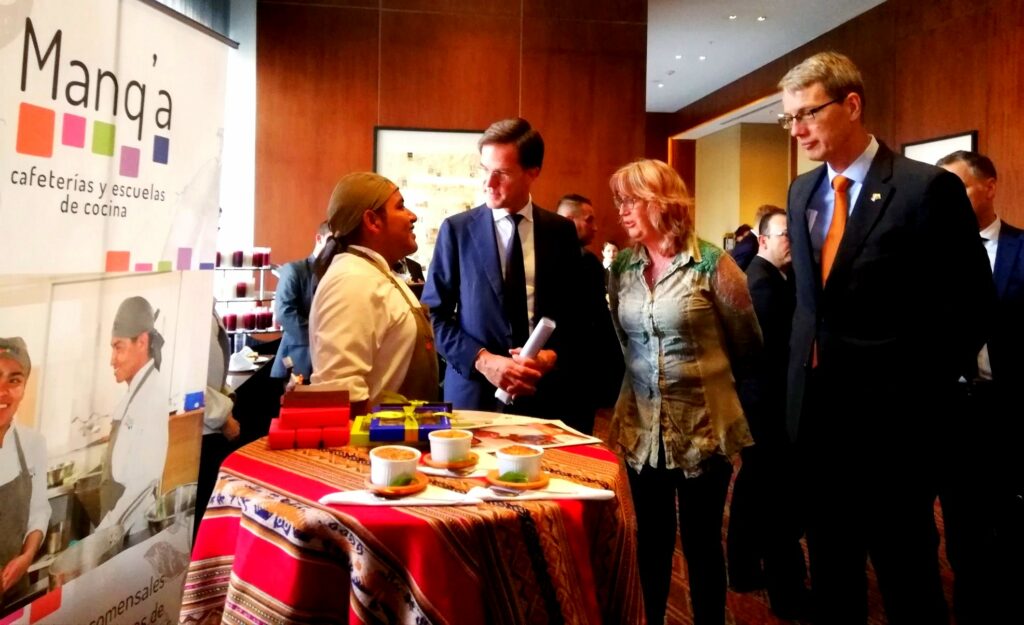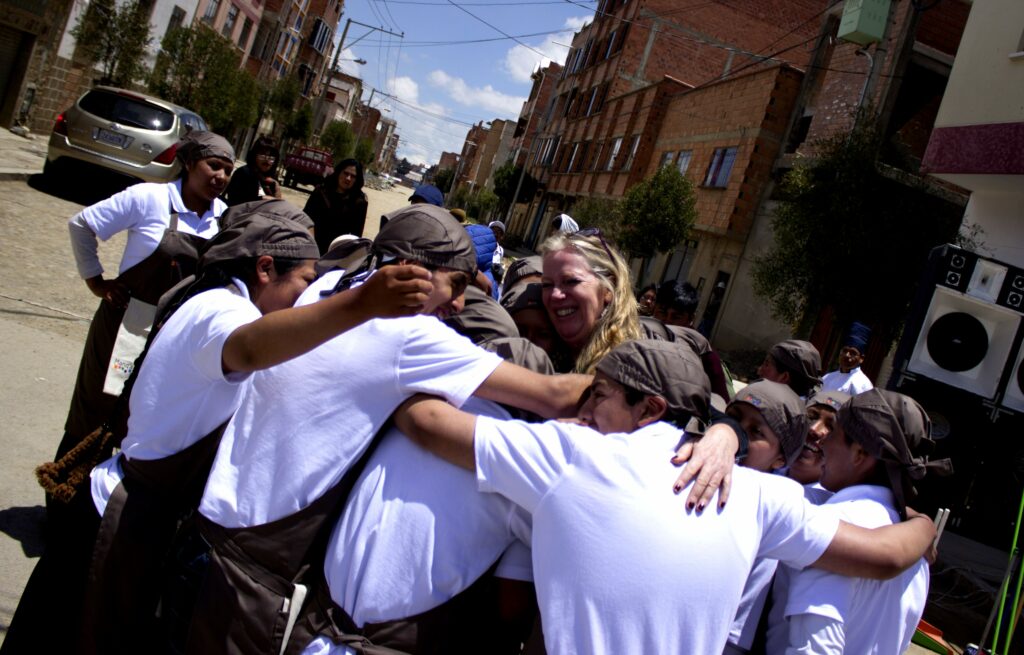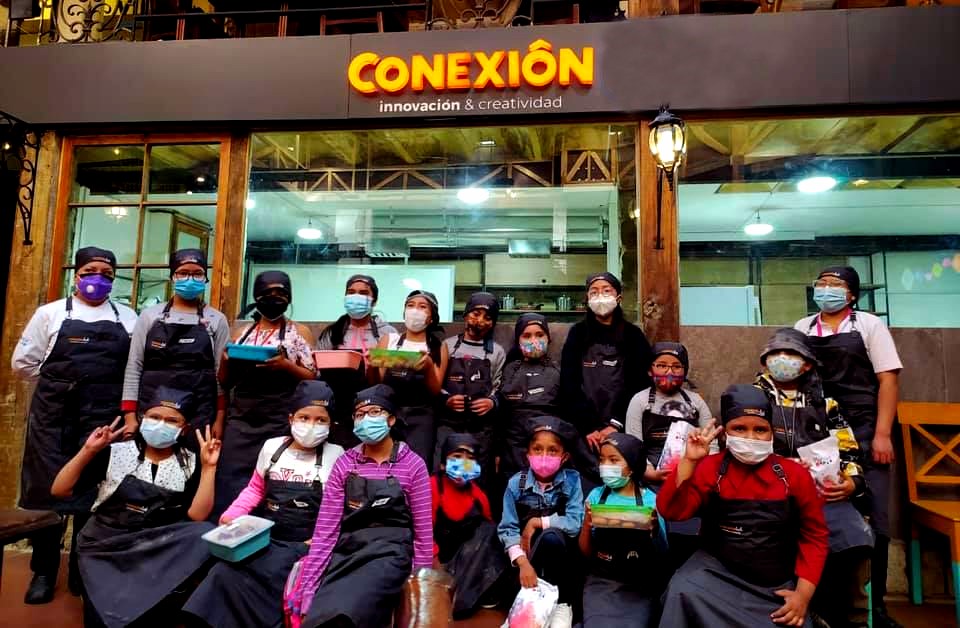In the past two years, Cordaid has successfully transitioned its activities in Latin America into a new regional NGO, Conexión, with branches in Bolivia, Guatemala, and Colombia. “We phased out as an INGO, while Latin Americans took over and created their own independent organisation. For me, this is a strong example of locally led working,” says Conny Toornstra, who was closely involved in the transition. In an in-depth talk, she looks back on a roller coaster ride and draws some conclusions.

When Cordaid and ICCO decided to join forces in 2020, one of the strategic agreements was to phase out ICCO projects in Latin America. This was in line with the corporate focus to work in conflict-affected countries with high levels of fragility, such as Afghanistan and South Sudan.
The decision was far-reaching, not in the least because of ICCOs longstanding and impactful history in Latin America. “That history covers 55 years. For a long time, it was ICCOs biggest regional programme”, explains Toornstra, who started working for ICCO in Latin America in 1986 and headed the Latin American operations from 2010 onwards.
“By 2014, we had worked in ten countries, had three regional offices, and had more than seventy largely Latin American staff, with an annual turnover of about ten million euros. Hand in hand with local partner organisations, we supported farmers, indigenous communities, women and youth in defending their rights and improving their livelihoods. We were committed to their causes in everything we did and ensured they could make themselves heard in international decision-making fora.”
Long before the recent transition into Conexión, you and your team had already started decentralising and localising the ICCO programme. Why was that?
“Dutch government funding, on which ICCO largely depended at the time, was going down drastically after 2014. Our budgets became a fraction of what they were, from 13 to 2 million euros in just a few years. So, we became a lot smaller and had to reposition ourselves. The days of only being an international financing agency were over. So, to remain relevant, we started designing projects, raising funds and implementing them, side by side with our partner organisations in Colombia, Bolivia, Nicaragua and other countries.”
“It takes more than a generation to combat this colonialist mindset, on both sides. But the red-carpet days were over.”
“The working relationship between the INGO and national NGOs changed completely. Before we transferred funds to partners, they implemented projects, reported back to us, and we evaluated them. Now, after 2015, we seek funding and implement together. We have increasingly started budgeting our costs as an INGO for our projects with our Latin American partners. We become less dependent on the Dutch government or head office support. And we are now being evaluated by our national partners, just like we evaluated them. The hierarchy is gone.”

Because of the budget cuts, ICCO thought of leaving Latin America already back then. Why didn’t you?
“Should we go, or should we stay? I asked and discussed this with every single one of our partners in all ten countries. The main message was that they wanted us to stay, even if we had little money for partners. It wasn’t about the money. ‘You have fought for half a century to help civil society become stronger; why leave now that we are stronger?’ partners in Brazil told me. ‘Maybe you have less money, but we still need your knowledge and support to engage in the international decision-making and political arenas. You, being an international agency, can help us with that. Your Dutch connection can be profitable to us.’ To a large extent, this is what we hear in all the countries, especially from the bigger national advocacy NGOs. The smaller ones wanted us to support them in finding new donors. It was clear that we still had a role to play even with less money. So, we stayed.”
You become less of a funder and more of a knowledge sharer and a broker. What kind of knowledge?
“Knowledge of the international donor landscape, its requirements and complexities. Of European political tendencies, such as migration, gender, climate, and how they impact international funding. But also more technical knowledge. In half a century, ICCO gained a wealth of expertise in rural development, farming, indigenous rights, gender justice, climate change and climate adaptation, and many other fields. We had enough to share.”
What was it like to shift from being a funder to seeking funds?
“In the beginning, it was hard. We had to develop this entrepreneurial spirit. Also, national partners we had been working with for decades expected us to be the ones providing the money and them doing work on the ground. We all had to get used to playing different roles.”
“We had to say goodbye to old national partners, which, after decades, was very painful. But new national NGOs knocked on our door and invited us to collaborate and work on new projects. That was refreshing. They didn’t treat us as the longstanding INGO partner who always used to come with a lot of money, but as equals. Until 2010, national NGOs sometimes rolled out the red carpet for me because I represented an INGO with a lot of money. It was neocolonial. It takes more than a generation to combat this colonialist mindset on both sides. But the red-carpet days were over.”
Do you still see traces of colonialism or deeply stereotypical thinking in international cooperation?
“Of course! When I travel with Latin Americans and meet UN or EU decision-makers and budget-holders to discuss funding opportunities or project proposals, they will often look at me and talk to me. Even though I do not represent or lead the group. Being blond and Caucasian makes me more important. It’s creepy.”
“Sometimes it goes the other way around, which irritates me just as much. European donors now feel obligated to stick to a diversity and inclusivity agenda. Often, this results in some kind of fake solidarity. They just tick their anti-racism, inclusivity and diversity boxes. When I have these one-on-one talks with them, discussing, for example, women’s rights or agribusiness development, say in Guatemala, they prefer to deal with someone from Guatemala because that is what their inclusivity protocol demands.”
In 2022, ICCO, by now part of Cordaid, decided to phase out of Latin America. Did this decision come as a shock, or was it a logical step further?
“Both! We had already become less financially dependent on Global Office. We had successfully started running ICCO/Cordaid’s Latin American programme as a self-supporting business unit. Our budgets were balanced, and we covered our own costs.”
“When Cordaid decided to stop in Latin America, we didn’t want this financially healthy social business, doing impactful and relevant work, to stop. For a while, we were afraid that was going to happen. That’s why saving this enterprise, turning it from an INGO-led programme into a regional, stand-alone NGO, totally managed by Latin Americans, has been our mission in the past 18 months. Legally, financially and organizationally, it was a rough ride.”
“And it was frightening. I was still the manager of more than seventy people at the time. What if they lost their income? This worried me a lot. But once we felt this would work, it was also great fun because the team had this feeling of ‘yes, we Latin Americans can do it on our own’. Without this INGO custodianship, this Dutch connection. Because, let’s be honest, however much that connection brought to Latin America, it was also a patronising connection.”
“This mission is completed. Conexión is alive, and it is kicking. It has an annual turnover of around eight million euros. It consists of three national NGOs, established in Bolivia, Colombia and Guatemala, each with its own board. They are connected by one brand, a governance agreement and sharing strategy and operational systems.”
“It has teams in La Paz (Bolivia), in three places in Guatemala, and in three places in Colombia, including in the Amazone. From day one, all teams have successfully designed, won and implemented new project proposals. Even before Conexión was legally registered, they started working on proposals, still wearing ICCO or Cordaid caps. They had to bridge the gap. Once Conexión was registered, and they could submit proposals wearing their new cap, donors and their auditors immediately wanted to assess and x-ray the new recipient. However, not all systems, protocols, and mechanisms are in place yet. The teams were working around the clock.”
“There are currently around 70 staff, but this changes according to the projects they run. Not INGO desk officers, but Latin American experts in agribusiness and young people, land ownership, indigenous rights, GBV, and climate change. Raising funds, implementing activities and fieldwork with other Latin American partners.”

In a few years, the ICCO Latin America team had to reinvent itself and resurface several times. ICCO became part of Cordaid in 2021; a little later, Cordaid decided to phase out from Latin America, and then there was the transition towards Conexión. Structures change constantly while project work on the ground continues, even intensifies. All this is also happening during COVID times. It must have been pure chaos.
“It was hard. New structures while the old ones were still there. Managing this, financially and legally, was quite a challenge, to put it mildly. New names, new faces, new monitoring, reporting and auditing systems and demands. And on top of everything you mention, there was also this political imbroglio in Nicaragua, and we had to move out of the country and start an office in Guatemala.”
“A lot of energy went into strategising at the Global Office level. Before Conexión was born, I coordinated work in Central and South America. At the same time, living like a nomad, I constantly participated in these Global Office sessions on the road, in airports, in caravans.”
“We knew there was a chance that things would stop in Latin America. We fought hard to regionalise further and continue as a new Latin American entity. Once the top management saw this was a sound plan, we got Cordaid’s support to do it.”
“People feel they have empowered themselves. There’s no big head office, operations are run more effectively, and more tailored to realities in Latin America.”
What kind of support?
“A transition budget and the financial leeway to make sure that, while the INGO is stepping out and the new regional NGO and its national branches are not yet there, we could still pay people’s salaries, pay for legal costs and unforeseen hiccups. This was crucial.”
“And we made clear agreements. Transitioning is chaotic enough as it is, especially if the INGO itself is also going through changes. People come and go. They change their minds, plans, and budgets, making things even more chaotic. Luckily, a short and concrete transition memorandum with key transition agreements kept us on course.”
“Besides legal and financial support, Cordaid also allowed me to coordinate and manage the transition process. That, too, is INGO support because they employ me. Conexión was born out of something I was a part of for years. I was there during the design and delivery, managing risks for the Latin American team and Cordaid. But I am not a part of it the way I was before. I am a board member of two of the three newly established NGOs, but for me, the establishment of Conexión was a professional and emotional disconnection process. Of letting go.”
Did it make it easier to raise funds as national NGOs?
“Some donors were enthusiastic about the whole INGO-national NGO transition. The Swedes, for example. They decided to fund Conexión projects because they are locally-led by national NGOs. Unfortunately, Sweden now has a right-wing government, and they have significantly reduced their support.”
“Conexión is growing in Guatemala, with secured funding from four, maybe five new donors. Colombia is also doing very well because of the aid and trade policies and the strong support of the EU and the Netherlands. Things are harder in Bolivia, not being a donor darling country.”
INGO provided financial support for about two years to make this transition work. Is Conexión financially self-supportive today?
“The three national NGOs are. Their operational costs are covered by the budgets of the projects they run. Which, in such a short period, is a real achievement. In the next stage, they will also need to cover the costs of the regional structure of the organisation, including communication and website costs. It’s comparable to what used to be the INGO global office, but then infinitely smaller.”
So, apart from the INGO-NGO transition, what has changed?
“Everything! People feel they have empowered themselves. There’s no big head office, operations are run more effectively, and more tailored to realities in Latin America. There’s less administration, less bureaucracy, and fewer overhead costs, meaning more cost-effectiveness. They successfully run their social enterprises like businesses without a European agency telling them how to do it. Locally-led working in a nutshell!”
Any downsides?
“Old ICCO and Cordaid Latin American staff kept their salaries, but newcomers, unfortunately, are paid less. And generally, employment conditions, like social security, aren’t as good. It was too expensive to maintain that. Still, of all the staff, only one left. People were willing to take risks just to make this work and to shape a business that was their own.”
“Be proud of something that is no longer yours: a strong, independent and inspiring family of incredible Latin American social change makers.”
“Not a downside, but a risk, is that national NGOs, anywhere, tend to become inward looking. Often, being in the middle of humanitarian crises and challenges, they haven’t got the time, the networks, or the money to keep up with what’s going on internationally. There are constant changes in the international political context, donor landscapes, financial policies, and new monitoring demands. But also digital innovations! You need a strong international connection to stay on track. Hence, it is important to stay connected with Cordaid. We still have an important role to play there. As an INGO, you can step back, even step out, but you should not cut all the ties.”
